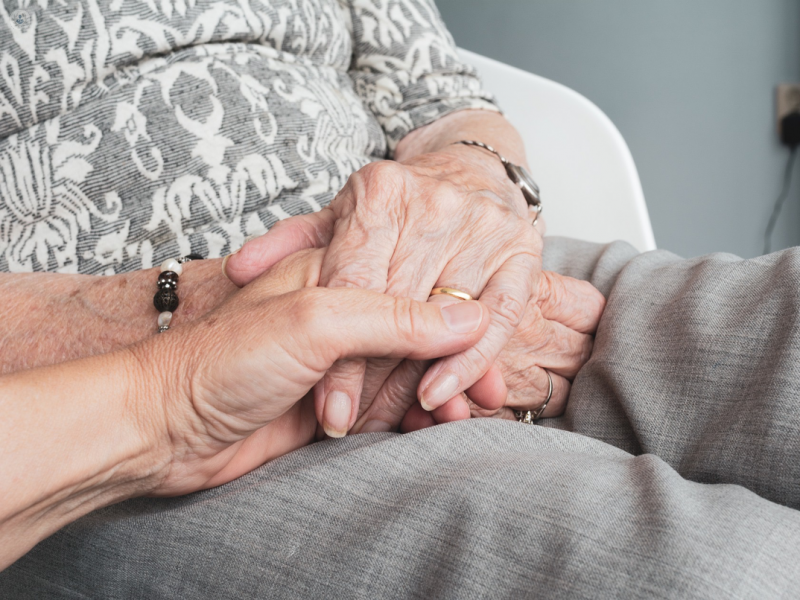Older patients are experiencing unusual COVID-19 symptoms: are these being overlooked?
Written by:According to the Regional Geriatric Program of Toronto, only 20-30% of elderly patients with COVID-19 actually report experiencing a fever and many of them may not even present with the main symptoms we associate with this novel virus, such as a cough and breathing difficulties.
We spoke to Dr Tarun Solanki, a consultant physician in general and geriatric medicine, who described these unusual symptoms that geriatric patients experience and explained why they are distinct from the younger population and what the consequences may be if they are not properly recognised.

How are COVID-19 symptoms in older patients currently being managed?
Since the pandemic started, general healthcare, as we know it, has undergone massive adjustments. All health centres, hospitals, clinics and social services have had to reform their standard working patterns to manage the influx of patients with COVID-19. These patients are currently being triaged to areas that are separated from usual admissions areas in A&E and other medical units.
In UK healthcare centres and hospitals, in particular, these patients are allocated to different areas or departments according to their main symptoms. If they present with a fever, cough, shortness of breath, tiredness and loss of taste and smell they are typically tested and sent to a specific COVID-19 cohort ward if they are in need of hospitalisation. Staff in these areas act with appropriate caution to prevent a patient to staff viral transmission.
Experts in geriatric medicine have always acknowledged that older people frequently present with unusual symptoms in any medical circumstance and this appears to be happening in the context of COVID-19 too. As a result of the unusual or atypical presentation in older people who are particularly vulnerable to infections, they may not be recognised as having COVID-19 at the time of admission and may result in delays in diagnosis and management. While patients are tested for infection with coronavirus, the tests are not a 100% sensitive and specific so a clinical acumen is essential so that older people are not sidelined on the basis of a single negative test. Failing to recognise infection with COVID-19 has consequences for the patient and also for the staff responsible for their care.
What are the usual symptoms of COVID-19?
The main symptoms of COVID-19, which we have all come to be familiar with over the past few months, include fever, sore throat, breathing difficulties, fatigue and loss of smell and taste. However, there are some rarer symptoms which many have experienced such as:
- loss of appetite
- nausea
- vomiting
- diarrhoea
- rash
- tachycardia (racing heart)
- seizures
- tremor
- delirium
- loss of coordination
What are the unusual symptoms seen in elderly patients?
In a recent survey that I conducted on Twitter, many of the respondents reported that the commonly recognised symptoms of COVID-19 were uncommon in elderly patients; instead, the most common atypical symptoms reported were:
- delirium
- diarrhoea
- lethargy
- falls
- reduced appetite
Those with significant experience in dealing with COVID-19 patients reported that even when there were other reasonable causes to these symptoms, such as a catheter-associated urinary tract infection which is associated with similar symptoms, some of these patients actually turned out to be COVID-positive.
The Regional Geriatric Program of Toronto has described a whole host of symptoms that elderly patients may present with when being admitted to a healthcare centre. This includes:
- delirium
- malaise
- functional decline
- falls
- generalised weakness
- conjunctivitis
- increased sputum production
- anorexia
- dizziness
- headaches
- rhinorrhoea
- haemoptysis (coughing up blood)
- chest pain
- diarrhoea
- nausea and vomiting
- abdominal pain
- nasal
- congestion
- anosmia (loss of smell)
Why do elderly patients present with different symptoms?
This may be due to several factors ranging from physical changes due to age, the simultaneous presence of more than one chronic disease, the inability to regulate physiological systems and the variation in presentations in older people related to frailty. All of these factors increase the likelihood of an elderly patient having non-typical symptoms of COVID-19.
How can healthcare staff overcome this problem?
It is imperative that all healthcare and social staff everywhere, on both a local and national level, are made aware of these symptoms and the high probability of older patients experiencing unusual COVID-19 symptoms. Failure to correctly identify these may mean that older patients are sent to the wrong wards where staff aren’t as properly trained and vigilant and may unknowingly spread the coronavirus. Therefore, it is important that staff on all possible wards where elderly patients may be admitted to ensure they are wearing the correct PPE and are taking the correct safety measures to reduce the risks of viral transmission.
In regards to swab tests, if the first has a negative result, but there is a clinical suspicion that COVID-19 may be present, then a repeat test is absolutely advised 24-48 hours later.
Taking all of this evidence into consideration, staff on general wards must be appropriately trained and wear the correct PPE to ensure not just their own safety, but the safety of their colleagues, all their patients and everyone in their immediate surroundings.
What are the consequences of missing a diagnosis in older people?
Coronavirus infection is a multisystem disorder and currently, our knowledge of the long-term consequences are unclear. However, on the basis of reports, it appears that many older people have persisting tiredness, lethargy and poor appetite. This can result in an older person losing weight, loss of interest in social activities and subsequent isolation leading to a spiral of decline in physical and mental wellbeing.
Dr Tarun Solanki is a highly-experienced consultant physician in general and geriatric medicine who is available for an e-Consultation through Top Doctors. Visit his profile and check his availability.


